Contents
The body of cattle needs vitamins in the same way as a human. Beginner cattle breeders who do not have the proper experience often underestimate the threat of beriberi in cows and calves. In fact, the lack of vitamins and microelements often causes poor growth, disease and even loss of livestock. With signs of beriberi, you can not mindlessly feed the animal everything in a row. Vitamins for calves and cows must be selected correctly, taking into account external factors and the state of health of each individual.
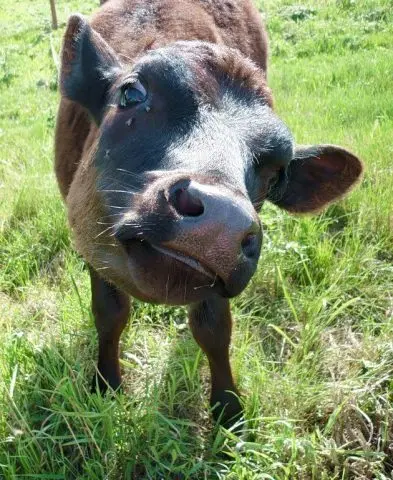
The value of fortification of cattle
Some farmers believe that cows that are free-range or fed concentrated feed do not need additional fortification. However, it is not. In winter, absolutely the entire livestock of cattle lacks vitamins and microelements. The situation is especially aggravated closer to spring, when the body’s own reserves are exhausted.
It is impossible to neglect the artificial fortification of cattle, because this can lead to serious consequences: from problems with the vision and coordination of the animal, to stopping the growth of calves, reducing the immunity of cows, and susceptibility to viral and infectious diseases. Problems such as a decrease in milk yield and weight of livestock are not discussed at all – a lack of vitamins has a bad effect on the productivity of cows.
A common problem for cattle of various ages and breeds is a decrease in immunity, which leads to more serious disorders in the animal body.
Vitaminization of calves
Usually, young cattle are grown to replace old and sick individuals in the herd (which is why they call it “repair livestock”). If for adult cows a lack of vitamins is very dangerous, then what can we say about calves. The body of young animals should not be deprived of the necessary trace elements and other useful substances. Special attention should be paid to calves in winter, when the animals switch to dry food.
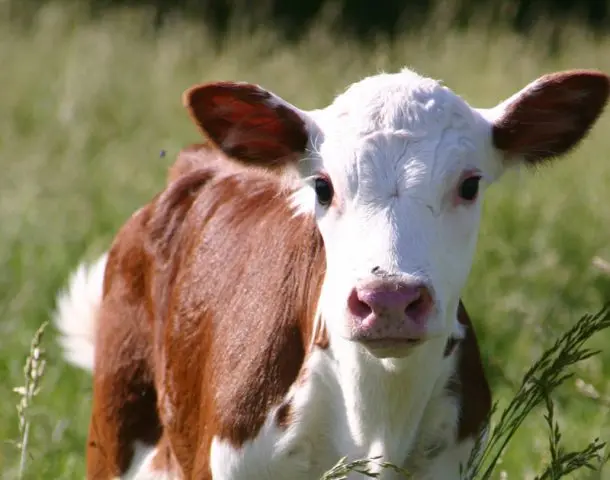
The lack of nutrients in the blood of young cattle is dangerous with consequences, such as:
- growth retardation;
- deformation and bone disease;
- dystrophy;
- problems with vision;
- decrease in the protective functions of the body;
- purulent processes on the mucous membranes;
- predisposition to bacterial and viral diseases.
Vitamins for cattle growth: where to get
For a growing calf, two vitamins are most important: A and D. Carotene (vitamin A) is necessary for normal blood formation and oxygen supply to organs. You can make up for the lack of vitamin A in feeding cattle by adding fresh orange vegetables to the diet of calves: fodder beets, carrots, rutabaga.
Vitamin D is responsible for the full absorption of calcium by the body of young animals. Its long-term deficiency ends in stunting, bone deformity, or rickets in the calf. Young animals must be fed with silage, bean hay, and fish oil should be added to dry food.
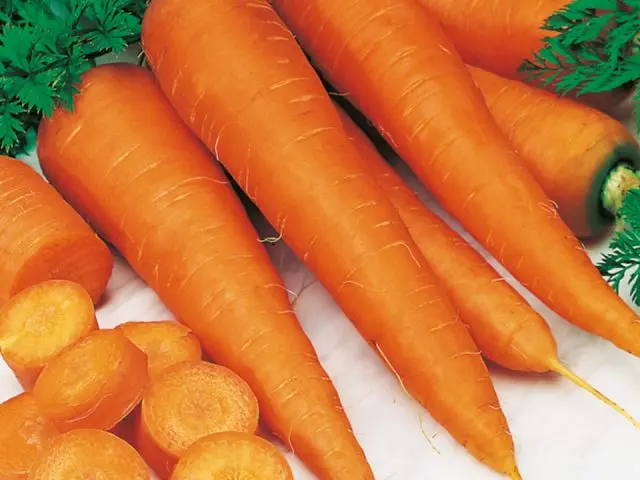
Vitamins for young cattle can be found not only in medicines. Calves need to be fed the right feed that promotes rapid growth and promotes health. Clover and alfalfa hay will help to fill the lack of nutrients. These herbs have a high enough content of D3, which protects the calf from the development of rickets.
Another option for natural fortification of calves is an infusion of spruce and pine cones. To prepare it, the cones are poured with boiling water and the product is insisted under the lid until it cools completely. Such a decoction should be added to the feed for young animals, it contributes to the rapid growth of calves.
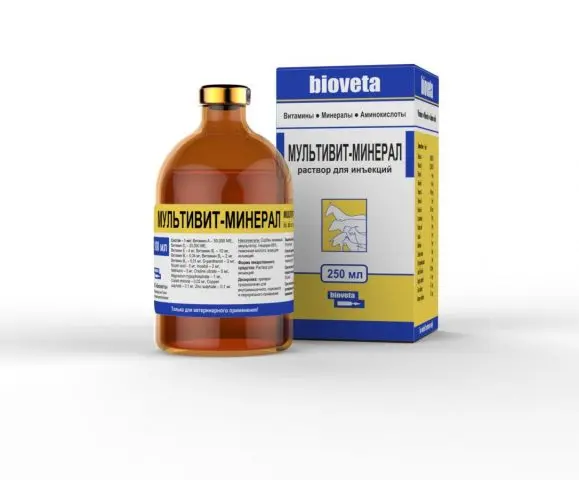
The farmer does not always have the opportunity and desire to feed young cattle with vegetables, prepare decoctions and tinctures for calves. In this case, complex drugs will help. Names of good vitamins for rapid growth of calves:
- “Catozal”;
- “Aminitol”;
- “Cyanophor”;
- “Nucleopeptide”;
- “Gamavit”;
- “Roborante”.
In the most advanced cases, it is recommended to use vitamins for young animals or fattening cattle in injections (for example, Eleovit). Such drugs act much faster.
Vitaminization of cows
Adult heifers and bulls need their own portion of nutrients. In the warm season, when there is enough grass and sunlight, you don’t have to worry about the immunity of the herd. But in winter, almost every cow will need additional fortification.
The diet of an adult livestock largely depends on the purpose of specific individuals. So, pregnant and lactating females need some vitamins and minerals, dairy cows will need other components in their diet, and beef cattle need a third “menu”.
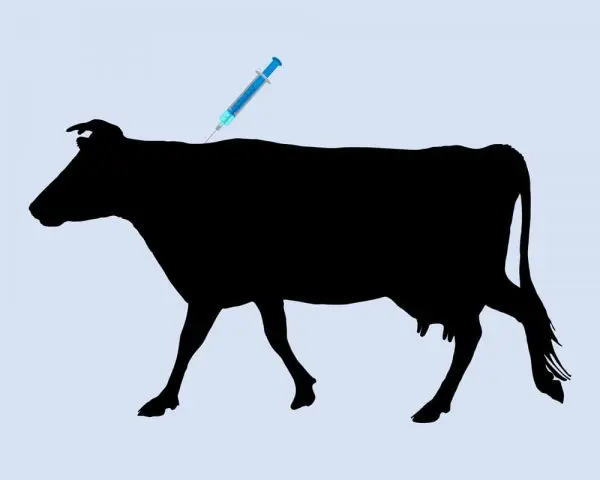
More details about vitamins for each type of cattle will be discussed below.
The norms of the content of vitamins in the blood of cows and calves
Ideally, before giving medicines to cows and calves, their blood should be tested. The analysis will show the content of certain vitamins and trace elements in the blood of the animal. Already on the basis of the data obtained, the dosage of drugs should be calculated.
Unfortunately, it is very expensive to check the blood of each cow from the herd, not every domestic farmer can afford such a luxury. In order not to harm livestock, you need to know the dosage of vitamins and trace elements per head per day. The required data is presented in the table below.
| A (M.E.) | D3 (M.E.) | E (mg) | V1 (mg) | Biotin (mcg) | Nicotinic acid (mg) | Beta-carotene (mg) |
Calves (replacement young cattle) | 30000 – 50000 | 3000 – 5000 | 50 – 100 60 – 100 | 30 |
|
|
|
KRS on forage | 40000 – 70000 | 4000 – 7000 | 200 |
|
|
|
|
Cash cows | 80000 – 150000 | 8000 – 15000 | 1000 |
| 15000 – 20000 | 6000 | 200 – 400 |
Knowing the established norms, you can independently calculate the dosage of vitamins in injections for fattening cattle, dairy cows or calves. Those who do not know how to inject cows can purchase drugs in the form of drops or tablets – they are added to water or feed mixtures.
Symptoms of beriberi in cattle
Lack of vitamins and minerals for cattle is very dangerous. Avitaminosis can lead to such consequences as:
- Reduced productivity. In dairy cows, at the same time, milk yield drops sharply, and the quality of milk deteriorates noticeably. Cattle of meat breeds significantly lose weight, the nutritional value of meat decreases.
- Violations in the work of the reproductive organs. The lack of certain substances adversely affects the ability of bulls to conceive offspring, and heifers – to endure it.
- Reduced immunity leads to the manifestation of latent chronic diseases. Often, against the background of this, cattle are additionally infected with viruses.
- Growth retardation is especially noticeable in calves of the first year of life. Young cattle not only develop more slowly, the protective function of the body decreases in the herd – the calves begin to get sick.
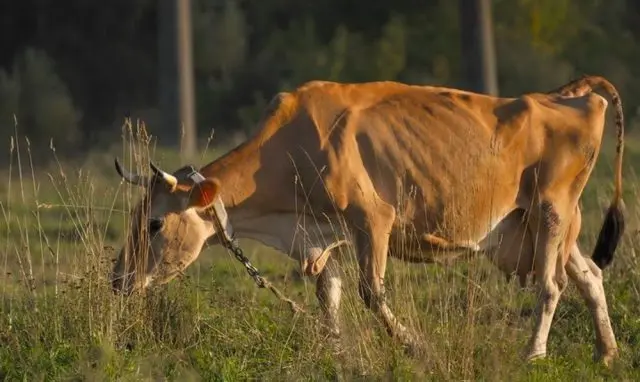
What vitamins are best for cattle
It cannot be argued that all cows need the same vitamins, moreover, in the same dosage. In veterinary medicine, it is recommended to choose vitamins for cattle, taking into account the purpose of an individual in a herd:
- Dairy cows are most often deficient in vitamin A in their diets. At the end of a long winter, fish oil should be added to the diet of cattle, because due to a lack of D3, dairy cows can lose their teeth.
- Cattle of meat breeds need to be fed with vitamins only in extreme cases, when the quality of dry food leaves much to be desired. Usually beef cows do not suffer from beriberi, but it is better to monitor the condition of the livestock in winter. Vitamins for muscle growth can be introduced into the diet of meat breeds of cattle, they will help increase the mass of cows.
- Random cows and bulls should eat well and receive all the trace elements necessary for health. A lack of vitamins such as A and B12 for this group of cattle can result in ovarian dysfunction in heifers and a decrease in sperm activity in bulls. Cows that are planned to happen in the spring should be given vitamin E in advance, because its deficiency causes involuntary abortions in cattle.
- Pregnant cows are called pregnant. Livestock from this group needs the highest quality and nutritious food. In order for the calves to be born healthy, and for the cows themselves to give birth more than once, the body of pregnant individuals must be supported with vitamins. In winter, you can use feed vitamins for cattle, containing A, D, B12 and E.

To understand this issue completely, you need to consider in more detail each group of cattle.
Vitamins for fattening cattle
A farmer who breeds cattle for meat is always faced with a choice: what drugs to use to increase the muscle mass of his cows. Several options are popular today, each of them is effective, but not all methods are safe.
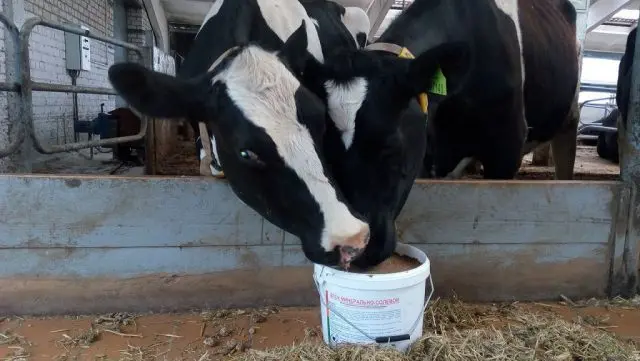
Antibiotics, hormonal steroids and metabolic boosters (food supplements) should be considered undesirable methods of building muscle mass in cattle. An excellent alternative to these drugs are special complexes. For fattening cattle, it is recommended to use the following vitamins:
- “Biovit-40”, which is recommended to be fed to young animals aged from a month to a year and fattening cattle;
- “Nucleopeptide” well increases the mass of livestock, and also improves the condition of wool (these vitamins are often given to show cows and bulls);
- “Eleovit” helps calves not only gain weight, the vitamin complex also strengthens the skeleton of cattle.
Vitamins for calves with bronchopneumonia
At the fattening stage, calves often become infected with bronchopneumonia. The disease is an inflammation of the bronchi or lungs. One of the common causes of bronchopneumonia is, just the low immunity of cattle, caused by beriberi.
Of course, it is better to prevent the disease and prevent a lack of nutrients in the body of the calf. If time is lost, and the animal has already become infected, you should proceed as follows:
- The causative agent of bronchopneumonia is bacteria, so it will be necessary to treat the disease with antibiotics.
- Drugs such as calcium gluconate and suprastin will help save the calf from an allergic reaction to the drug, reduce vascular fragility.
- In order for young cattle to come out, glucose solutions and vitamin A are additionally given.
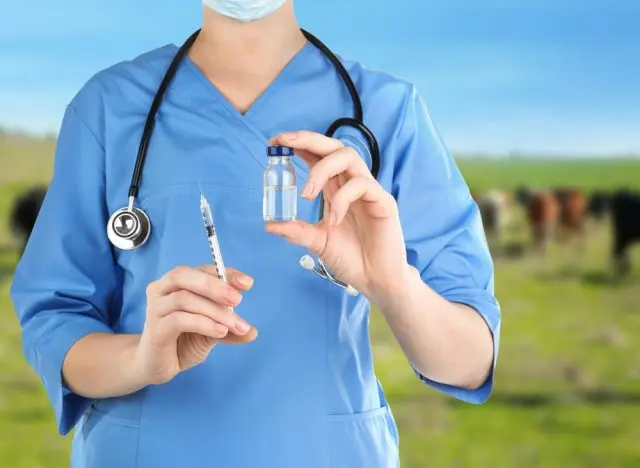
Vitamins for pregnant cows
Like all pregnant cows, pregnant cows need a double portion of nutrients, trace elements and vitamins. Pregnant heifers need enhanced nutrition, and in winter, pregnant animals must be given vitamin complexes.
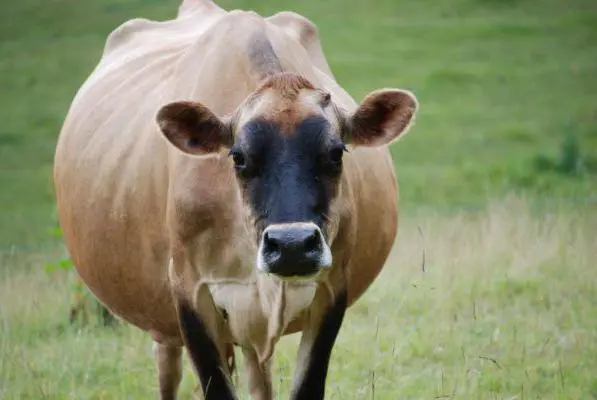
The lack of certain vitamins is dangerous both for the cow itself and for the fetus. Cause and effect:
- Vitamin B12 for a pregnant cow is simply necessary. The lack of this element leads to the birth of a weak, sick or dead young. As a result of B12 deficiency, cow stomach walls poorly absorb nutrients and trace elements necessary for the body: cattle lose weight, there is a lack of coordination, iron deficiency in the blood.
- Vitamin E in the blood of cattle is responsible for the proper functioning of the ovaries, the elasticity of the walls of the uterus, metabolic processes in the body of the fetus and mother. If a cow is unable to conceive, it is likely that she is deficient in vitamin E. This element is important at every stage of pregnancy. Component E is added to cow food a month before mating and continues until the end of pregnancy.
- Vitamin D for cattle “in position” is also vital. D3 deficiency is the only cause of rickets in calves. In addition, this substance helps the body of cattle to absorb calcium, which means that it affects the condition of the bones and teeth of a pregnant cow.
- Vitamin A is more important for a born calf than for its mother. Young animals born in winter, carotene is administered intramuscularly in the first days of life. This helps to avoid serious health problems for the calves.
Vitamins for cows in winter
In winter, the body of cattle is most weakened, because the animals are indoors, in conditions of high humidity, low temperature, cows do not see sunlight, do not eat fresh grass. Therefore, in winter, the diet of cattle should be given special attention.
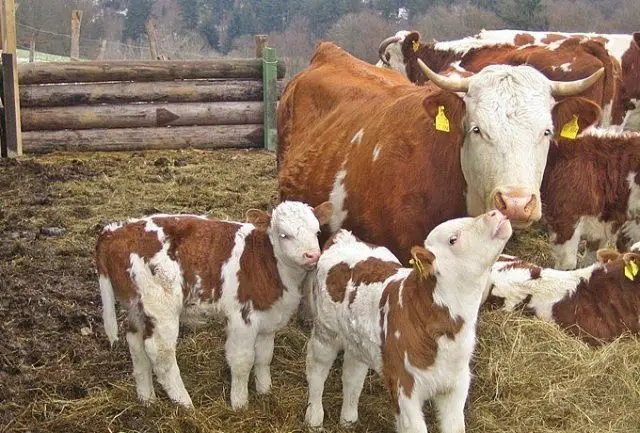
The optimal feed option is properly harvested hay from various types of grass. If the quality of dry food is unsatisfactory, it can be replaced with purchased balanced mixtures, fresh vegetables, herbal infusions can be added.
At the first signs of vitamin deficiency, it is urgent to introduce vitamins in the form of drugs into the feed. Without conducting a detailed analysis of the blood of cattle, it is better to use complex agents as food additives.
Recommendations for proper and balanced feeding
In winter, during pregnancy and lactation, during recovery after a serious illness, at the stage of growth of young animals, the body of an animal needs not only vitamins, but also minerals. Cattle most often need such components as:
- Protein or protein. The substance is responsible for cell reproduction, the amount of protein in the blood of cattle depends on the growth of muscle mass, the state of internal organs, and the circulatory system. Protein is given to weak and sick cows, lactating and milking individuals, calves born in winter.
- Due to copper deficiency, cattle lose their appetite, anemia and weakness appear in the cow. You can suspect a lack of metal in the blood by falling out shreds of wool. If you do not make up for the lack of copper, reproductive function will decrease, and a dairy cow may completely lose milk.
- Iodine is responsible for the fat content of cow’s milk. Milk yield may decrease or disappear altogether if the animal lacks this trace element. Pregnant cows also need iodine – its deficiency can cause the fetus to “resorb” in the early stages of pregnancy.
- A sufficient amount of manganese in the blood of cattle ensures the normal functioning of the reproductive system. If the trace element is not enough, a pregnant cow may have a miscarriage. Calves that put on too much fat but don’t grow tall also need manganese.
- Salt in large quantities is death, but in small doses, the trace element is simply necessary for cattle. A cow’s appetite, milk taste, milk yield, reproductive system health and ability to bear strong offspring depend on a balanced amount of salt in the cow’s diet.
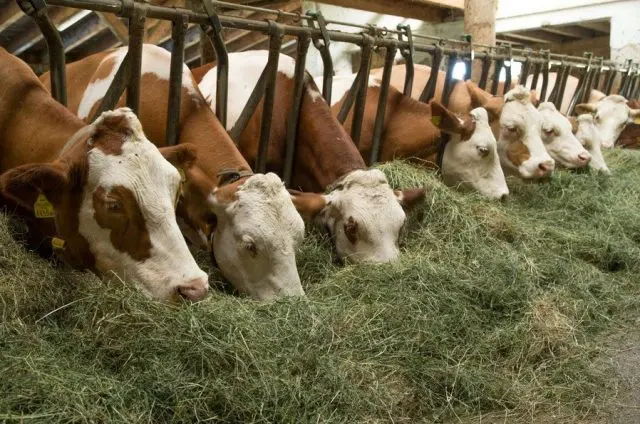
If the cattle feed is saturated with the necessary vitamins and minerals, the cows will endure the longest and coldest winter well.
Conclusion
Vitamins for calves and adults are an important part of the cattle diet. Additional support is needed for the body of animals in winter, during the growth of young animals, fattening cows, pregnant and lactating females, bulls for mating.
A balanced diet and a well-designed diet will protect cattle from a breakdown and reduced immunity, which, in turn, will save you from serious health problems and prevent the loss of livestock.









